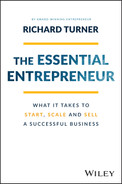CHAPTER 4
Timing is everything
Having the right product or service (I'll call these the ‘product’ from here on in for simplicity) at the right time is essential when starting a business. You can have the best product in the world but if the world isn't ready for it, you'll face a high risk of failing.
If you need to educate the market you'll burn a lot of cash, and when starting a new business for the first time cash is usually a very limited commodity. If you run out, it's literally ‘game over’, both for the business and possibly for you personally as well, which can set you back a long way in life.
You might find that you're too late to the market because someone whose timing was perfect has beaten you to it. There's good and bad in that. On the bright side, they may have spent the money required to educate the market. However, they will have also taken the lead brand position, leaving you to play costly catch-up trying to position your brand over theirs. In addition, you'll have to do things better than them by further disrupting the market (see chapter 9 for everything you need to know about disruption).
Technology is a classic example. With technology you can do many incredible and wonderful things, but if the product or application you've developed doesn't solve a problem currently facing people or businesses, you're going nowhere fast. If you believe it does solve a problem, but people just don't know it yet, then you'll have to do a lot of educating, and getting the message through to the market will be expensive and must be carefully planned.
Our first family business, Regency Food Services, entered the market at a time when most takeaways, restaurants and hotels had many providers for every category of product. These included groceries, frozen foods, fresh meats, dairy, confectionery, salads, smallgoods and even packaging. We entered that market on the back of a trend we saw happening in the United States that we were also seeing signs of in the eastern states of Australia. The trend was called ‘total foodservice’. It involved a rationalisation of the industry whereby the categories were combined under large, consolidated companies, providing the convenience of a ‘one-stop’ service to the customer. Regency Food Services was the first organisation to really bring the total foodservice concept together in South Australia and was well recognised nationally, winning Australian Foodservice Distributor of the Year in 1997. This positioned us extremely well when Bidvest, the first multinational in this sector, came into the market in the late 1990s and targeted our company for acquisition, resulting in a very successful sale in 1999.
My most recent venture, ZEN Energy, is another example of being in the right place at the right time. The company entered the market in 2004 when there were very few mainstream residential solar energy providers. At that time, articles on climate change were just starting to emerge in the newspapers and our prime minister, John Howard, was introducing the first subsidies for reducing carbon emissions in the home. The solar industry was still in the realms of ‘weird science’ for most people, who didn't understand the technology.
If you've done it yourself, you'll know that researching what's involved in installing a solar energy system in your home — wondering what components to choose, who should install it and how to claim a rebate — can be confusing and time consuming. What the industry lacked at the time was a fully branded and integrated home solar energy system where the company and the components used were completely trusted. It was an opportunity to pioneer a new industry and create the leading brand in the market.
Initially, we called the company ZEN Home Energy Systems. We brought together manufacturers to produce the components under our brand and to match the high-quality components into a fully integrated system for the residential market. We kept the offering simple, going to market with four systems that powered from one-quarter to all of the average home. It was a brand that people loved and could identify with, but most importantly it took away the need to understand the technology and instead delivered it to the market with a simple choice of systems that people trusted.
Having the right product in the market at the right time resulted in the company reaching dizzying levels of growth over the first few years. While the rest of the world was going through the global financial crisis, ZEN was achieving year-on-year growth in excess of 400 per cent, winning Australian Entrepreneur of the Year in 2010 for the Cleantech sector and reaching number 4 on BRW's list of fastest growing companies in Australia.
The lesson here is that timing is critical and having the right product at the right time raises your chances of success enormously.
If you're not sure of the market timing, you need to revisit your validation model and conduct further research with your potential customers to understand whether they would buy your product, and whether they would buy it at the price you believe you could deliver it for. This might mean going back to the drawing board a number of times to get the product fit and market acceptance to a demand level that makes it viable to launch your product. You must also consider barriers to entry so that people can't easily copy what you're doing, whether this is for protection of your intellectual property or your business model in the form of a patent. This also applies to protecting your brand and logo by applying for a trademark (I'll elaborate on this in chapter 13).
